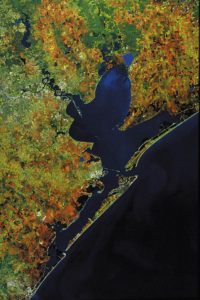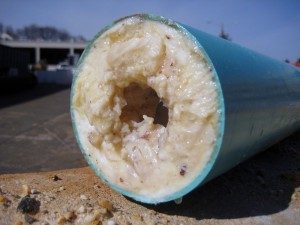 Cease the Grease is a regional campaign, coordinated by the Galveston Bay Foundation (GBF), with the purpose of reducing sanitary sewer overflows through public education and awareness. Sanitary sewer overflows (SSOs) from fats, oils, and grease (FOG) are a source of concern for harmful bacteria found in Galveston Bay. Aging infrastructure, combined with improper disposal of FOG in single and multi-family homes, can lead to costly problems for both local governments and citizens in terms of sewer lines, home plumbing repairs, and environmental remediation.
Cease the Grease is a regional campaign, coordinated by the Galveston Bay Foundation (GBF), with the purpose of reducing sanitary sewer overflows through public education and awareness. Sanitary sewer overflows (SSOs) from fats, oils, and grease (FOG) are a source of concern for harmful bacteria found in Galveston Bay. Aging infrastructure, combined with improper disposal of FOG in single and multi-family homes, can lead to costly problems for both local governments and citizens in terms of sewer lines, home plumbing repairs, and environmental remediation.
Cease the Grease is directed towards five target audiences: homeowners, apartment residents, schools, cities, and restaurants. The goal of the campaign is to educate these audiences to properly dispose of FOG, recycle used cooking oil, and properly maintain grease traps in restaurants to prevent harmful bacteria from polluting Galveston Bay.
The well-being of Galveston Bay is critical to the vitality of the Houston-Galveston region. Chances are if you live, work, study, or recreate in or around Houston, you directly depend on Galveston Bay in some way.
The bay historically accounted for 90% of oysters commercially harvested in the state of Texas, but drought, hurricanes, and bacteria impairments have reduced that to about 30%. In addition, human and animal waste introduces nutrients into the bay that can lead to algal blooms and subsequent fish kills, and localized bacteria hotspots can make conditions temporarily unsafe for swimming. One of the major sources of bacteria and human waste entering the bay is from sewer overflows caused by fat, oil, and grease blockages from our kitchen sinks.

When fats, oils, and grease are poured down the drain, city sewer pipes become clogged. That doesn’t just mean an inconvenient problem for homeowners and city managers, but it also means trouble for Galveston Bay. Clogged pipes prevent waste from traveling to treatment plants. Instead, the untreated waste overflows onto city streets and travels into Galveston Bay via storm drains. This problem becomes especially harmful during heavy rainfall events.
Septic systems and drain fields are affected too. Fats, oils, and grease discharged into septic systems cause malfunctions which lead to costly repairs and more frequent tank pump-outs. Properly disposing of kitchen fats, oils, and grease not only protects your home, but also your community and the health of Galveston Bay.
Do
- Avoid using the garbage disposal by scraping food scraps, fats, oils, and grease into trash cans.
- Cover the kitchen sink drain with a catch basket and empty into the garbage as needed.
- Place oil and grease in covered (sealable) collection containers.
- Once collection containers are full, dispose of properly in the trash.
- Recycle used cooking oil at your nearest oil recycling station.
Don’t
- Pour fats, oils, grease, and food scraps down the drain, even in small quantities and even if you have a garbage disposal.
- Rely on hot water to push fats, oil, and grease through the pipes. It won’t clear your pipes, and you will still experience clogs.
- Squirt dish soap down the drain with your grease, it won’t help break up a clog.
This campaign was adopted from Dallas Water Utilities, which very successfully launched the Cease the Grease Campaign in 2005 in partnership with the North Texas Grease Abatement Council. The Dallas Cease the Grease Campaign has dramatically reduced the occurrence of monthly SSOs, in the Dallas area, through public outreach, education, and enforcement. Dallas Water Utilities also uses the recycled cooking oil to create heat and electricity, which is then used to power the Southside Wastewater Treatment Plant. Dallas Water Utilities provided the campaign materials and concepts for Galveston Bay Foundation to adopt this campaign in Galveston Bay region.


